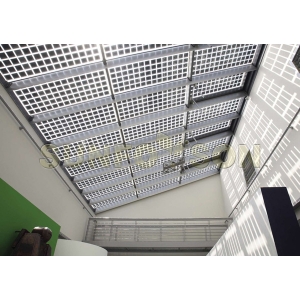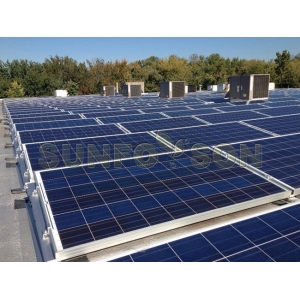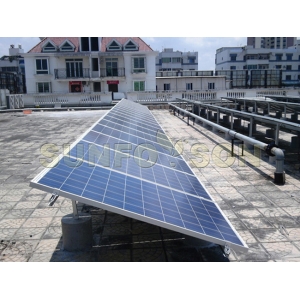The United States hit Chinese solar companies with punitive import tariffs of 30 percent or more on Thursday, ruling they had dumped cut-price solar panels into the U.S. market.
In the latest salvo in a series of ongoing trade disputes between Beijing and Washington, the U.S. Commerce Department said it sided with U.S.-based solar companies that had complained a wave of Chinese imports had wrongly undercut their pricing and forced several renewable players out of business.
With Thursday's move, Washington set tariffs on shipments from most of the top Chinese exporters, including Suntech Power Holdings Co Ltd and Trina Solar Ltd, at about 31 percent.
Several of the Chinese companies and a solar trade group opposed to the tariffs denounced the duties, and said they would drive up costs for the clean energy source, stunting its fast growth.
The new tariff was "a heavy blow to America's solar industry," Jigar Shah, head of the anti-tariff Coalition for Affordable Solar Energy, said.
Shah said he hoped the tariffs would be reduced before they are finalized later this year, since they would likely cost thousands of jobs in the nascent industry.
The new U.S. ruling stems from a complaint filed last October by the U.S. subsidiary of Germany's SolarWorld AG, and six other U.S. companies that alleged unfair competition and had sought duties well above 100 percent.
China will criticize the move, according to White & Case trade attorney Scott Lincicome, "but it's unlikely to further enflame bilateral trade tensions because high anti-dumping duties were widely expected."
China's solar companies, which hold more than 60 percent of the global market, have largely relied on subsidized markets in Europe and the United States in recent years for purchases of their products, prompting criticism that huge loans from Chinese state-run banks and low-ball pricing gave the Chinese companies an unfair advantage.
Under the decision, 59 Chinese solar companies that petitioned the U.S. government in the case will also face an import duty of about 31 percent, including Yingli Green Energy, LDK Solar, Canadian Solar, Hanwha Solar One, JA Solar Holding and Jinko Solar.
Other Chinese companies could now face a 250 percent tariff, although those levels could be altered before the final ruling is issued from the Commerce Department in the coming months.
"Today, SolarWorld and the many industry players who embrace the sustainable efficiency gains and price declines that come from fair competition can take heart that the U.S. government is standing up against Big China Solar," Gordon Brinser, president of SolarWorld Industries America, said in a statement.
The U.S. ruling, retroactive to cover imports dating back 90 days, comes two months after Washington set more modest tariffs of less than 5 percent on imports from China because of what it deemed Beijing's unfair support for its solar industry.
Chinese solar companies and critics of the SolarWorld complaint say global competition has been crucial to bringing down the cost of renewable power, which still relies on government subsidies to compete with fossil fuels such as coal and natural gas.
Suntech, the world's largest manufacturer of solar panels and which also operates a panel plant in Arizona, denied it had sold its products below its cost of production and said it opposed any trade barriers.
"All leading companies in the global solar industry want to see a trade war averted. We need more competition and innovation, not litigation," Andrew Beebe, Suntech's chief commercial officer, said in a statement.
Shares of U.S.-based solar companies rose on the news, with First Solar Inc gaining 6.7 percent and Sunpower Corp gaining 10 percent. Sunpower Corp was already rallying after Apple Inc said it would use the company's solar panels for its solar farm.
U.S.-listed shares of Chinese solar companies dipped, particularly Yingli Green Energy, which was off 13 percent, while Suntech dropped 5.8 percent and Trina fell 7.9 percent.
SPARRING ON TRADE
President Barack Obama, running for re-election in November, has promised to crack down on what he said were unfair Chinese trade practices. In March, Washington challenged China's export restrictions on critical "rare earth" industrial materials in a complaint, together with the European Union and Japan, to the World Trade Organization.
Chinese government officials have previously threatened to impose trade duties on U.S. shipments of polysilicon, the key material used in solar panels, if the U.S. moved to penalize Chinese solar companies.
Solar panel prices tumbled by more than 50 percent since the beginning of 2011 amid a glut of supplies triggered by declining subsidies in Europe and rapid global growth in the production capacity of solar wafers, cells and panels.
That steep solar price drop forced many companies in Europe and the United States into bankruptcy and decimated the once-lucrative margins across the industry.
Among those casualties was Solyndra, the California-based start-up that shuttered operations last year after taking more than $500 million in U.S. loans, prompting criticism that the Obama administration was favoring uncompetitive renewable power.
Morningstar Equity Research analyst Stephen Simko said new duties would not halt the drop in solar panel prices, predicting that the U.S. market will attract imports from Japan, Europe and even Chinese-owned factories in other countries.
"The United States is not a large enough portion of the market to alter those dynamics," he said.
The U.S. solar market doubled in size last year, but remains less than 10 percent of the overall global demand, and is likely to be overtaken this year by purchases in China for the first time.
Lawyers for SolarWorld have said Chinese exports of solar cells and modules swelled to $2.8 billion in 2011 from $1.2 billion in 2010, exceeding even the sharp growth that saw U.S. solar installations double last year.
Still, Chinese companies have not been immune to the pain. Market analysts have said many smaller, less competitive Chinese solar companies have closed, and share prices for Suntech, Yingli and Trina have plummeted by more than 75 percent over the past year.















